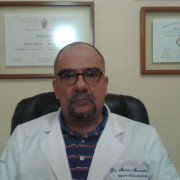
Persistence of papillary thyroid carcinoma is usually associated with elevated stimulated thyroglobulin levels. To evaluate the association between moderately elevated stimulated thyroglobulin levels and the persistence of papillary thyroid carcinoma one year after thyroidectomy and radioiodine ablation. Out of a cohort of 97 patients with papillary thyroid carcinoma, we selected those with available stimulated thyroglobulin level measurements (in the absence of thyroglobulin antibodies) after one year of initial treatment with surgery and radioiodine. The subjects were stratified according to whether the stimulated thyroglobulin level was between 1-10 ng/ml or above 10 ng/ml. Twenty-seven patients were included in the study, 11 with a stimulated thyroglobulin level between 1-10 ng/ml, and 16 with values greater than 10 ng/ml. Median age and gender proportion was similar between both groups. As expected, median stimulated thyroglobulin levels were significantly greater in the second group (5.1 vs. 42 ng/ml; p < 0.001). A stratified analysis aiming at associating stimulated thyroglobulin levels with disease persistence yielded an overall risk of 0.58 (95% CI: 0.1-3.09; p = 0.52) for those subjects with levels between 1-10 ng/ml, while for those with levels > 10 ng/ml the overall risk was 1.71 (95% CI: 0.32-9.1; p = 0.52). The positive predictive value for a stimulated thyroglobulin level between 1-10 ng/ml was 64%. A moderately elevated stimulated thyroglobulin level is an uncertain predictor of papillary thyroid carcinoma persistence.








